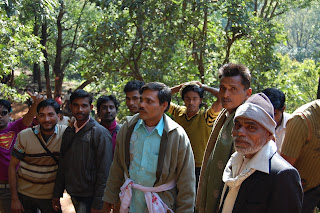On my last Sunday here, I woke up early to go meet my friend Manoj to watch/play cricket. This friend's nickname is "Dhoni" after the captain of the Indian cricket team because he plays so well. I took the bus to a village about halfway from Bilaspur to his house, and had a glass of fresh mango juice while I waited. After I was done and was standing and waiting, a rickshaw driver started asking me questions about where I was from, why was I here, etc., and a small crowd gathered around.
I was picked up and we went off to the cricket ground, which was a dusty field in front of a school. Dhoni's teammates (who are all from his village) were waiting, and soon the game began. Dhoni started out batting in both games, and in both games was out before he scored any runs - the only two times in his life it had happened, he told me. He said he was so excited to show off that he got out quickly. When it was their turn to field, I played with them, fielding 2 or 3 balls, and not making any real mistakes. Dhoni made up for his batting by doing a good job of bowling, getting a few batters out. They won both games, which were played for the stakes of 50 rupees per game.
After the game, I took some team photos and promised to send them to the team. The players were all from the same village, and I went back with them to the small hotel where they go every Sunday after their match. We filled up a table in the back and they got samosas. I can't eat samosas, so I had a cup of tea and a Mazaa, which Dhoni insisted on buying for me. One thing that happens often in the village is that people will always insist on paying for things.
It was a small village hotel, on the freshly (and only) paved main road. It had an uneven cement/rock floor, and the front was filled with an open-air display of its fried foods. As we sat, the children of the owner snuck peeks at me from the back room, and a crowd gathered around the table. The owner (who may have been drunk) asked me if I wanted a number of specific local wines, one by one... "do you want GP"... "do you want mahua...", etc. At this point it was around noon, and I told him it was too too early to drink, but at night I would.

After the hotel, we went to Dhoni's house. It was a fairly standard village house, two small buildings sandwiching a courtyard. The front building has the father's bedroom, a small store, and a room that acts as something like living room during the day and a bedroom for everybody else during the night. At one end is a small TV hooked up to a satellite dish that sits on their tile roof. The back building has a kitchen with small wood/dung burning stoves and another with a gas range, along with storage room for a year's worth of rice. The back building also has a bedroom for his older brother who is often away, as he works for the railroad. His mom, dad, sister-in-law, and two nieces (from his oldest brother) live there. He stays there on Saturday and Sunday nights, but otherwise lives on the JSS Ganiyari campus. There is also a cowshed and a hand pump off to one side.
He had not yet showered, and I went with him and his friend Sanju to his oldest brother's house, where they have a small concrete shower area. I think that the pump there is powered, so they can wash in the overflow from the tank without having to do extra work. They showered, while I waited inside in the shade. Everyone else in the house (his oldest brother, sister-in-law, and nephew - their son lives at home while the daughters live with the grandparents) was asleep in the afternoon heat.
We went back for a meal of rice and daal, accompanied by raw onions, kerela (a bitter vegetable), and pickle, and then we went back to the main road where I waited for the bus. While I was waiting, I saw a scarf across the street I wanted to buy, so I asked Dhoni to come with me to help... I decided to purchase it, and once again he wouldn't let me pay. When I took out my money, Sanju put me in a bear hug, and Dhoni and the shopkeeper agreed to use this transaction to settle some earlier debt (I will find a way to pay him back before I leave, even if it means slipped money into his pocket!)
The day in the sun gave me my first (mild) sunburn of my India adventure, on one of the last days. When I made it home, I put a plastic chair in the bathroom and poured cool water on myself.










